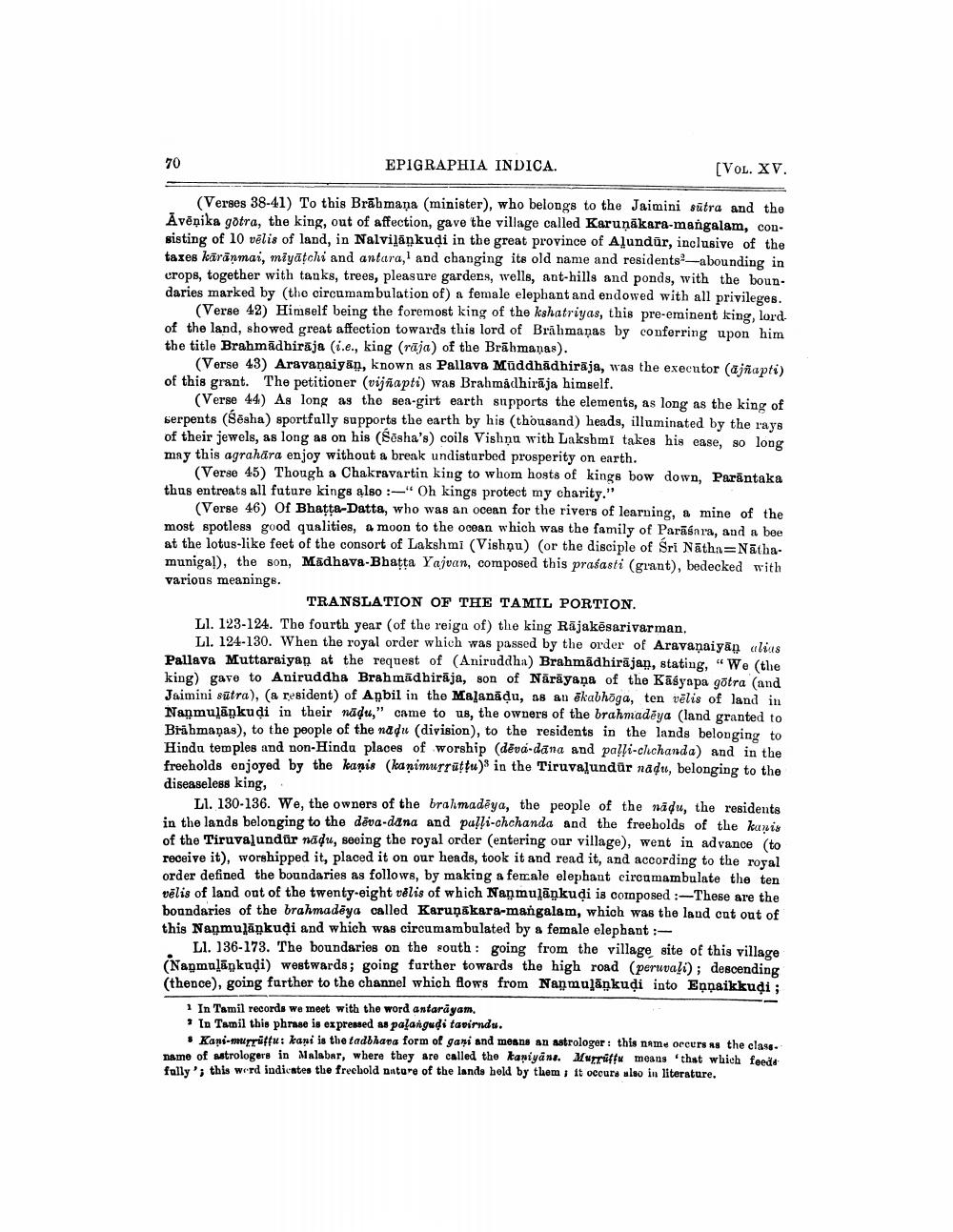________________
70
EPIGRAPHIA INDICA.
[VOL. XV.
(Verses 38-41) To this Brahmana (minister), who belongs to the Jaimini sutra and the Avēņika gotra, the king, out of affection, gave the village called Karunakara-mangalam, consisting of 10 vēlis of land, in Nalvilankuḍi in the great province of Alundur, inclusive of the taxes kārāņmai, miyaṭchi and antara,1 and changing its old name and residents-abounding in crops, together with tanks, trees, pleasure gardens, wells, ant-hills and ponds, with the boundaries marked by (the circumambulation of) a female elephant and endowed with all privileges.
(Verse 42) Himself being the foremost king of the kshatriyas, this pre-eminent king, lordof the land, showed great affection towards this lord of Brahmanas by conferring upon him the title Brahmadhiraja (i.e., king (raja) of the Brahmanas).
(Verse 43) Aravanaiyan, known as Pallava Müddhadhiraja, was the executor (ajñapti) of this grant. The petitioner (vijñapti) was Brahmadhiraja himself.
(Verse 44) As long as the sea-girt earth supports the elements, as long as the king of serpents (Sesha) sportfully supports the earth by his (thousand) heads, illuminated by the rays of their jewels, as long as on his (Sesha's) coils Vishnu with Lakshmi takes his ease, so long may this agrahara enjoy without a break undisturbed prosperity on earth.
(Verse 45) Though a Chakravartin king to whom hosts of kings bow down, Parantaka thus entreats all future kings also:-"Oh kings protect my charity."
(Verse 46) Of Bhatta-Datta, who was an ocean for the rivers of learning, a mine of the most spotless good qualities, a moon to the ocean which was the family of Parasara, and a bee at the lotus-like feet of the consort of Lakshmi (Vishnu) (or the disciple of Sri Natha Nathamunigal), the son, Madhava-Bhatta Yajvan, composed this prasasti (grant), bedecked with various meanings.
TRANSLATION OF THE TAMIL PORTION.
Ll. 123-124. The fourth year (of the reign of) the king Rajakesarivarman,
Ll. 124-130. When the royal order which was passed by the order of Aravanaiyan alias Pallava Muttaraiyan at the request of (Aniruddha) Brahmadhirajan, stating, "We (the king) gave to Aniruddha Brahmadhiraja, son of Narayana of the Kasyapa götra (and Jaimini sutra), (a resident) of Anbil in the Malanaḍu, as an ēkabhoga, ten vēlis of land in Nanmulāņkuḍi in their nadu," came to us, the owners of the brahmadeya (land granted to Brahmanas), to the people of the nadu (division), to the residents in the lands belonging to Hindu temples and non-Hindu places of worship (děvá-dana and palli-chchanda) and in the freeholds enjoyed by the kanis (kanimurruṭṭu) in the Tiruvaļundür nadu, belonging to the diseaseless king,
Ll. 130-136. We, the owners of the brahmadeya, the people of the nadu, the residents in the lands belonging to the deva-dana and palli-chchanda and the freeholds of the kanis of the Tiruvalundur nadu, seeing the royal order (entering our village), went in advance (to receive it), worshipped it, placed it on our heads, took it and read it, and according to the royal order defined the boundaries as follows, by making a female elephant circumambulate the ten vēlis of land out of the twenty-eight velis of which Nanmulāņkuḍi is composed :-These are the boundaries of the brahmadeya called Karunakara-mangalam, which was the land cut out of this Nanmulankuḍi and which was circumambulated by a female elephant :
Ll. 136-173. The boundaries on the south: going from the village site of this village (Nagmulankuḍi) westwards; going further towards the high road (peruvali); descending (thence), going further to the channel which flows from Nagmulankuḍi into Ennaikkuḍi;
1 In Tamil records we meet with the word antarayam.
In Tamil this phrase is expressed as palanguḍi tavirndu.
Kapi-murrüftu: kani is the tadbhava form of gani and means an astrologer: this name occurs as the classname of astrologers in Malabar, where they are called the kapiyans. Murrüffu means that which feeds fully'; this werd indicates the freehold nature of the lands held by them; it occurs also in literature.




